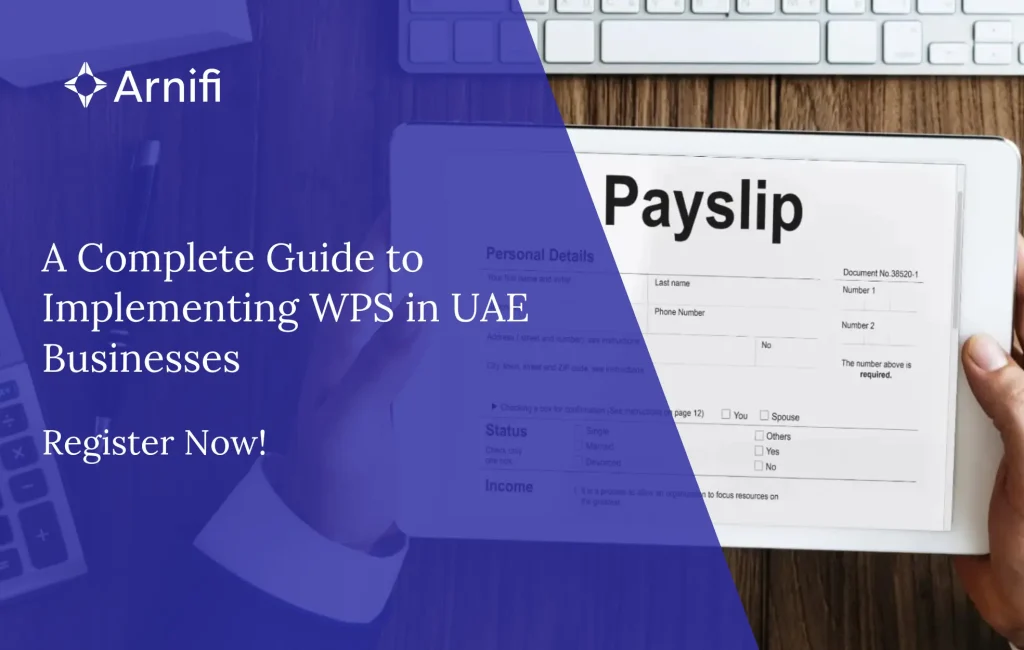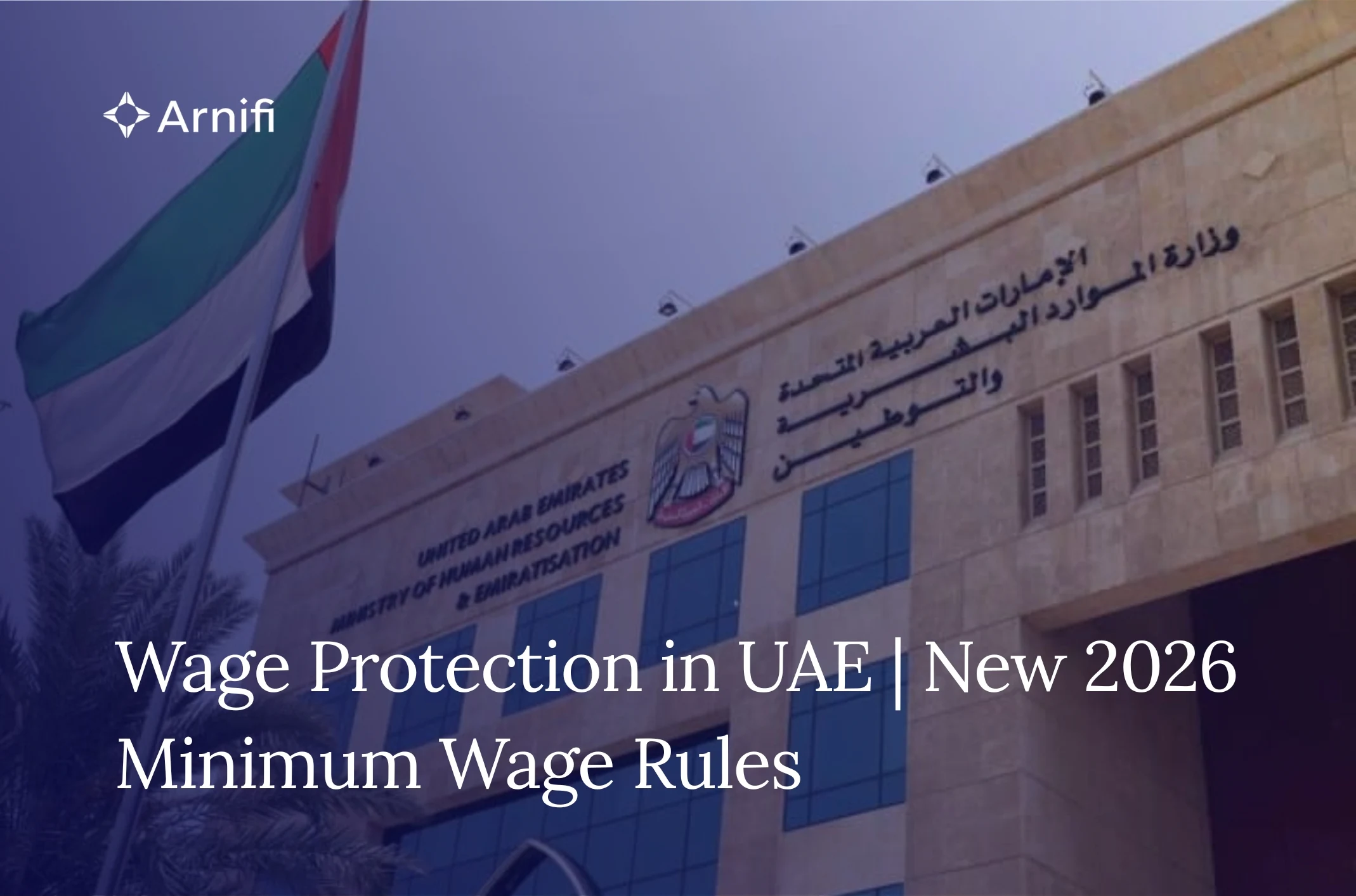A Complete Guide to Implementing WPS in UAE Businesses
by Shethana May 20, 2025  7 MIN READ
7 MIN READ
Missing pay deadlines or messing up payroll in the UAE can cost you a lot. MOHRE starts with alerts: penalties kick in if employees still haven’t been paid 15 days after payday. By day 17, MOHRE can even stop issuing new work permits for your business. Wait 30–45 days, and legal action could follow. On top of that, fines are steep: AED 5,000 for each unpaid or late-paid employee, and fines of up to AED 50,000 if multiple salaries are affected.

Table of contents
What is WPS?
The Wage Protection System (WPS) is a salary-transfer platform that the UAE government uses to transfer salaries digitally. MOHRE and the UAE Central Bank created it together just to ensure that private-sector workers get their salaries on time. Every month, you upload a file of your payroll (called a Salary Information File, or SIF) and an approved bank or exchange house pays the wages into your employees’ accounts. In other words, your payroll runs through the WPS portal so the ministry can verify salary payments.
WPS was launched in 2009. Since then, it has become the standard way to pay salaries in the UAE. If you’re an employer, it means you’re required to route wages through the system. This ensures transparency and protects employees. You can’t pay people manually or in cash outside WPS (if you try, MOHRE will catch you and fine you).
Why WPS compliance matters
Compliance isn’t optional. Labour law in UAE demands timely payment through WPS, so staying compliant avoids serious trouble. MOHRE monitors your payroll closely. The moment salaries slip beyond the grace period, you face penalties. For example, any unpaid or late wage invites a fine of AED 5,000 per affected worker, up to AED 50,000 for more significant violations. On top of money fines, the ministry can suspend your license. Missing pay can block new visas and work permits for your company.
Beyond penalties, good payroll builds trust. Paying through WPS shows that you treat employees fairly. A transparent payroll record means staff feel secure knowing each salary is guaranteed. If paid late or off-system, workers can complain via MOHRE’s unpaid wage portal. That can lead to audits and damage your reputation. Instead, on-time WPS paychecks keep morale up and disputes low.
Step-by-step WPS setup process
To use WPS, you need to prepare and register correctly. Here are the key steps:
- Bank account and WPS agent: Open a corporate account with a bank that is approved by WPS or an exchange house. This account will handle salary transfers.
- Register on the MOHRE portal: Sign up for the MOHRE WPS portal (eservices.mohre.gov.ae) to get your employer login ID.
- Prepare employee data: Collect each worker’s details (name, job title, labour card number, salary, allowances, deductions, and UAE bank account or WPS-card info). Enter all this in a Salary Information File (SIF) each pay period.
- Submit the SIF: Upload the SIF to the WPS system by the due date (usually 1 day after your contract payday). The WPS system or your bank will check it for errors.
- Salary disbursement: If the SIF is valid, MOHRE/Central Bank issues a payment order, and your WPS agent transfers the approved salaries into employee accounts.
- Confirm payment: Ensure all SIF employees receive their salary via WPS. Keep records of all the transactions as a proof.
This might sound involved. The main idea is to set up a WPS account and upload payroll, and then the system pays everyone via their bank accounts. You repeat this each month, after each payroll run.
Common WPS problems (and fixes)
| Issue | What happens | How to fix it |
| Late or missing WPS submission | MOHRE sends reminders and can suspend permits or take action for late wages. | Schedule payroll deadlines carefully (use calendar alerts or software). Consider outsourcing or EOR services so someone else handles the deadlines. |
| Errors in the SIF file | The WPS portal rejects the payroll file and asks you to correct mistakes. This delays salaries. | Double-check all data before uploading. Validate fields (bank account numbers, IDs, salary totals). Many payroll systems or banks can pre-validate your SIF. |
| Employees without bank accounts | Wages can’t be transferred into an account, so the payment fails. | Give those workers a bank account registered in UAE or a WPS payroll card so that the system can pay them on time. |
| Under-covered payroll | MOHRE checks that enough salaries are paid (roughly 80% of the total payroll). Falling short flags non-compliance. | Include all staff and allowances in the SIF. Don’t hold back portions of salaries outside WPS. Pay as much of the total payroll as possible on time. |
| Paying cash or outside WPS | Any unpaid salary outside the system triggers fines and inspections. | Move all salaries into the WPS. Treat cash pay as a red flag. If you have been paying off-system, contact MOHRE to regularise before a complaint is filed. |
These are some typical issues. In our experience, errors usually come from bad data entry (wrong account numbers, missing IDs) or missed steps. It pays to run a quick check before hitting “submit.” If a payroll file fails, fix it immediately and resubmit. That prevents more significant penalties.
How an EOR service helps
Handling all this yourself can be difficult, especially if you don’t have a UAE office or payroll team. When you hire someone through the EOR, they pay the salary. For example, one tech startup client had 10 people on the payroll. When they were onboarded, the EOR set up the WPS account, uploaded the first SIF, and made the payment – all on schedule. All 10 then received their salaries on time.
Using an EOR means you don’t have to worry about the WPS portal. The payroll team collects timesheets and contract information from you, then runs the WPS process in full. That includes validating the SIF, fixing errors, and ensuring the WPS agent pays everyone by the deadline. You are also kept updated if MOHRE sends any notices. Clients often say it’s a relief knowing a professional handles WPS.
Best practices to avoid penalties
- Regular payroll audits: After each pay run, reconcile your payroll records with the WPS transfer report. Make sure the totals match and that everyone on the payroll is paid. Keep backups of salary info. An internal audit catches errors early.
- Pay market rates: Officially, there’s no fixed “minimum wage in UAE” for expats, but salaries must meet basic living needs. Use industry salary surveys or EOR benchmarks. Extremely low wages or unpaid allowances can invite complaints, so stay competitive.
- Fund the payroll account in advance: Always pre-fund the WPS payroll account before the actual date of payment.
- Use reliable payroll tools: If you do payroll in-house, use software that outputs a WPS-ready SIF. Partner with a WPS agent or EOR to review your file before submission.
Following these steps will reduce the risk of fines and disputes. Pay on time, pay fully through WPS, and document everything.
Need help handling WPS?
Arnifi HR provides the same in the UAE and handles the complete WPS process end-to-end. No stress, no fines, no last-minute issues. If you’re ready to get compliant and free up your time, reach out and let’s sort your payroll today.
Top UAE Packages

Related Articles
Top UAE Packages



